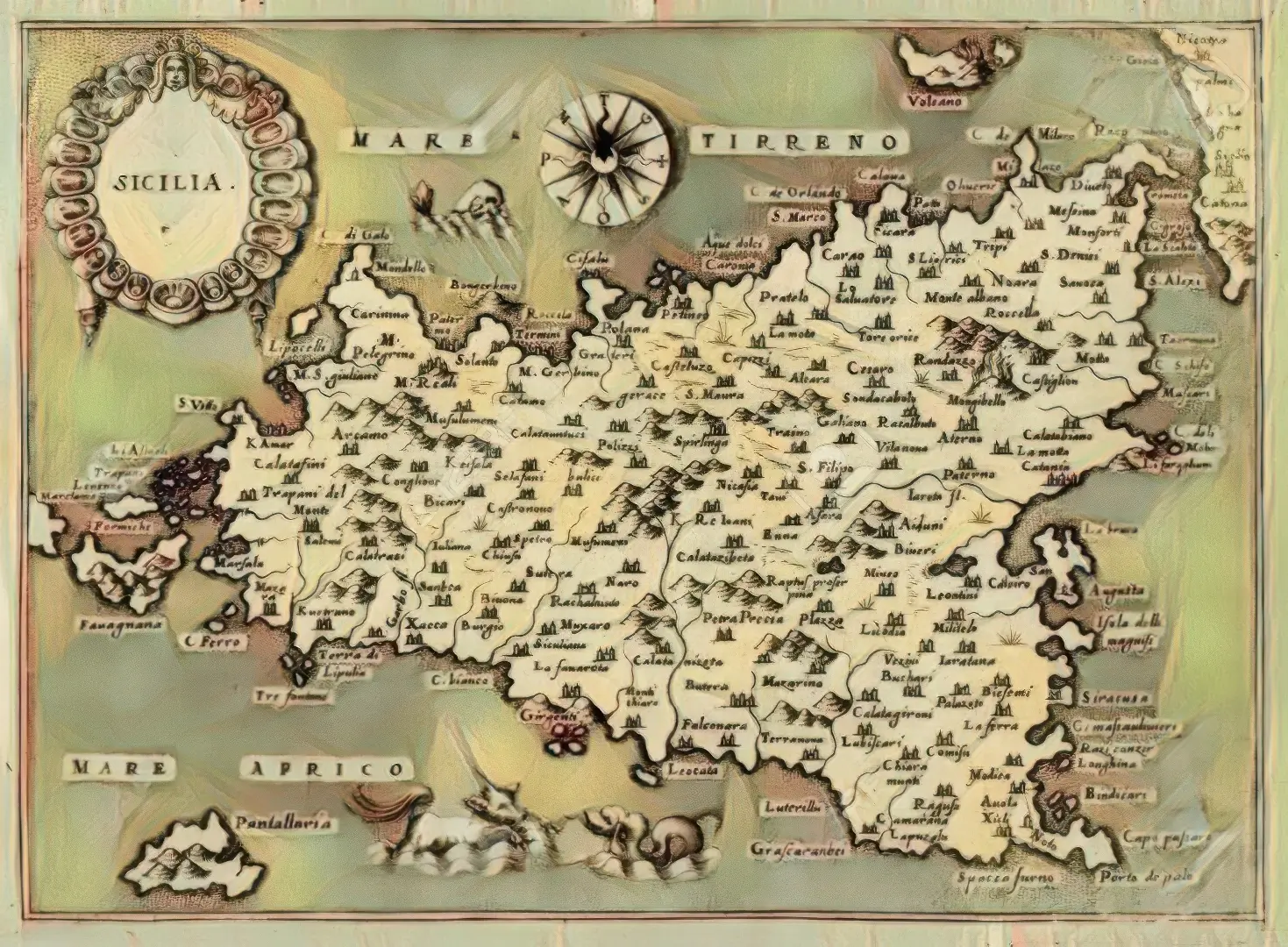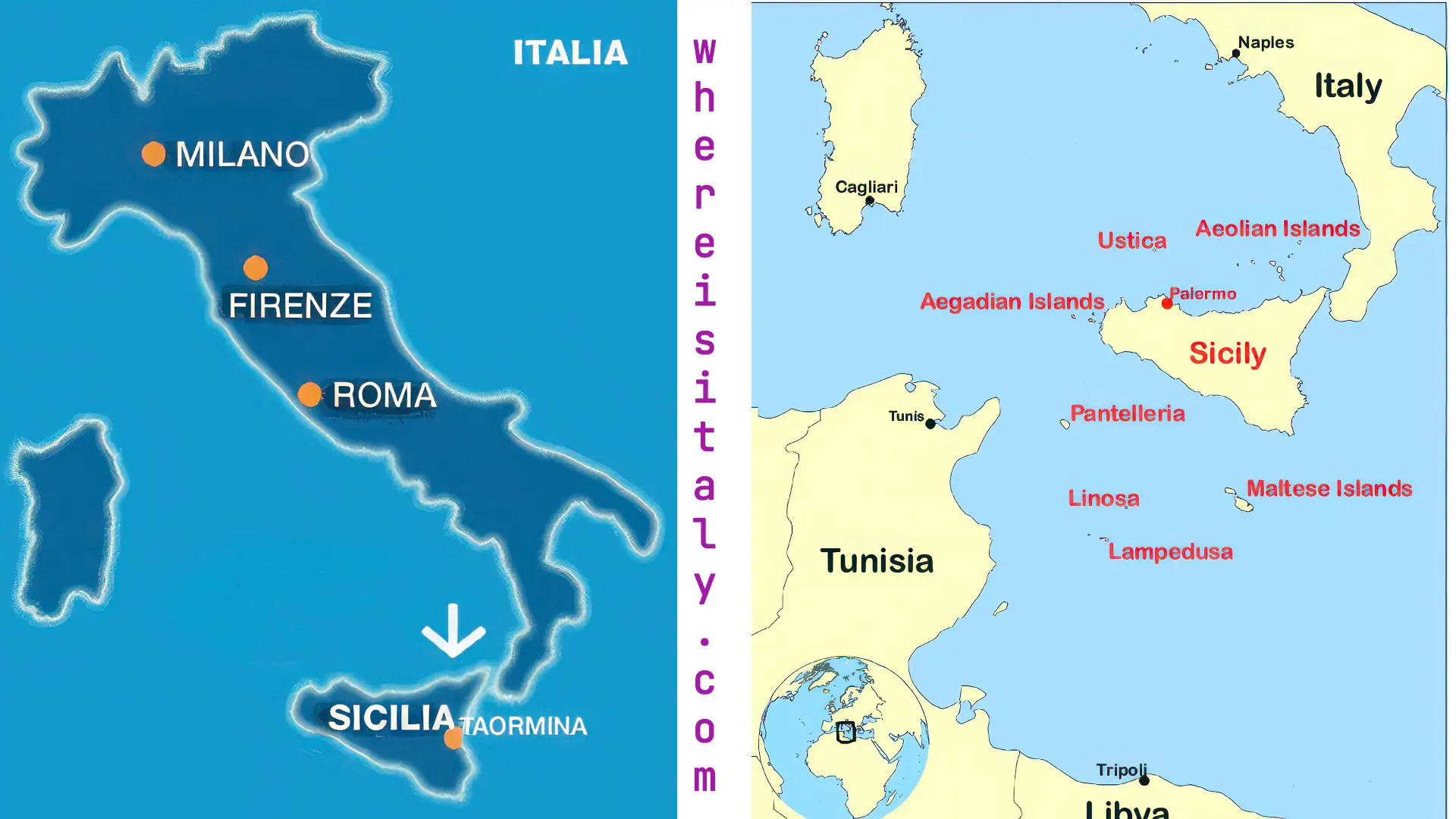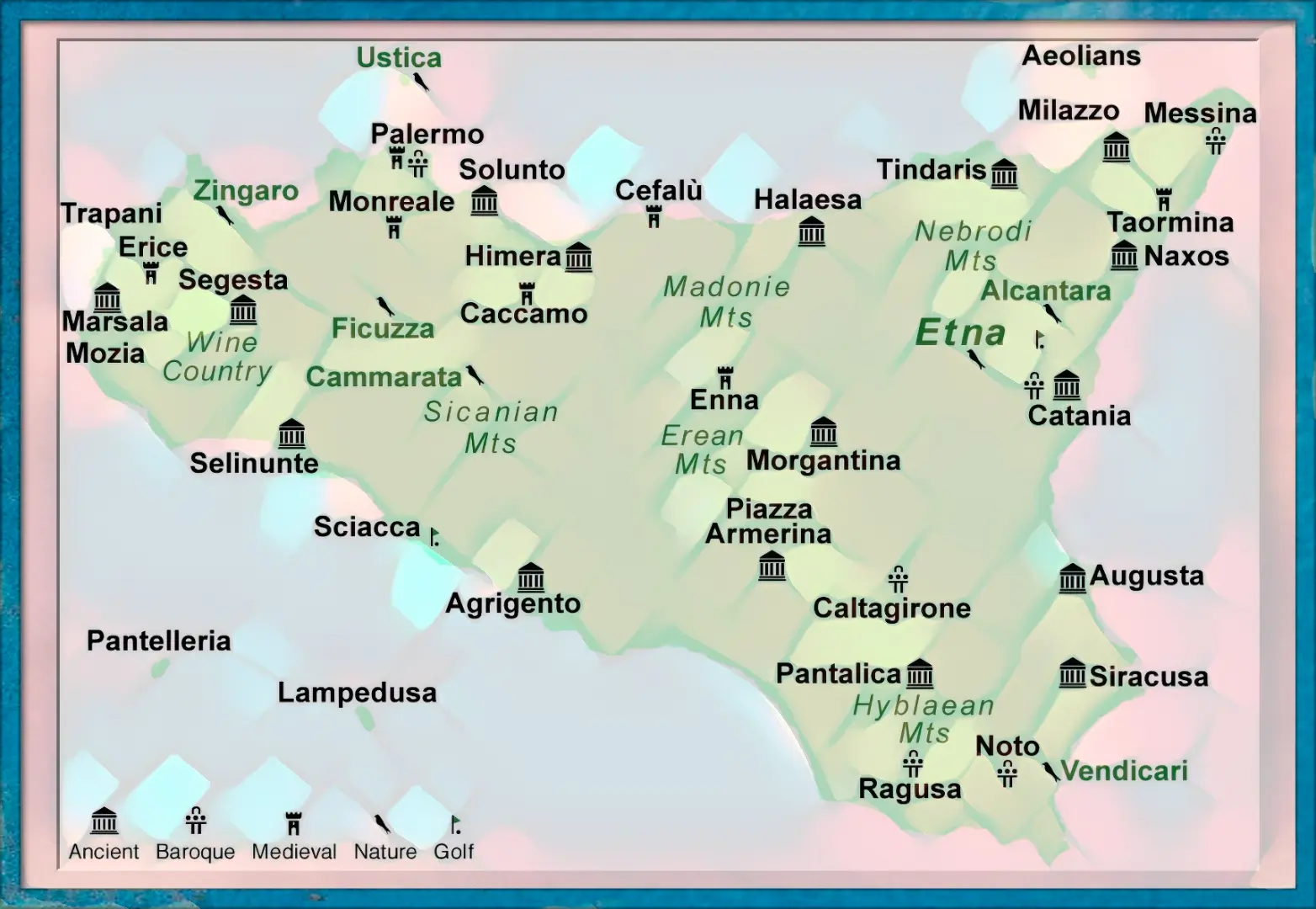We are looking for the answer “Is Sicily Part of Italy?”. Answer is Yes, Sicily is an autonomous region of Italy and the largest island in the Mediterranean Sea. It is located south of the Italian Peninsula and is separated from it by the Strait of Messina.
Sicily
Sicily is an autonomous region of Italy, known for its natural beauty, rich history, and diverse culture. The island is the largest in the Mediterranean Sea and is located just off the southern tip of the Italian Peninsula. Sicily has been inhabited for thousands of years and has been ruled by many different civilizations, including the Greeks, Romans, Byzantines, Arabs, Normans, and Spaniards. Each of these cultures has left its mark on the island, creating a unique blend of art, architecture, cuisine, and customs.

Sicily is home to many breathtaking natural wonders. The island is surrounded by crystal-clear waters that are ideal for swimming, diving, and boating. The coastline is dotted with picturesque fishing villages and stunning beaches, such as San Vito Lo Capo, Mondello, and Scala dei Turchi. Inland, the landscape is rugged and mountainous, with spectacular views of the sea and the countryside.
One of the most fascinating aspects of Sicily is its rich history. The island is home to many ancient ruins, such as the Greek theater in Taormina, the Temple of Concordia in Agrigento, and the Roman Villa del Casale in Piazza Armerina. These sites provide a glimpse into the island’s past and offer a fascinating insight into the lives of the people who lived there thousands of years ago.
Sicily is a fascinating and beautiful island that is well worth a visit. Its natural beauty, rich history, and diverse culture make it a unique destination that appeals to travelers of all ages and interests. Whether you are interested in exploring ancient ruins, relaxing on the beach, or indulging in delicious food and wine, Sicily has something to offer everyone.
Is Sicily Part of Italy?
Sicily is a beautiful and fascinating island in the Mediterranean Sea, located just off the southern tip of Italy’s mainland. The island has a rich and complex history, and its culture is a unique blend of different influences. One of the most commonly asked questions about Sicily is whether or not it is a part of Italy. The answer is yes, but the island has a complicated relationship with the Italian mainland.

Sicily has been a part of Italy since the country’s unification in 1861. But the island has a long and complex history that predates its incorporation into the Italian state. Sicily was first settled by the ancient Greeks, who established colonies on the island in the 8th century BC. The island was later conquered by the Romans, who made it a province of their empire. After the collapse of the Roman Empire. Sicily was ruled by a series of different powers, including the Byzantines, Arabs, Normans, and Spaniards.
In the 19th century, Sicily was still a part of the Kingdom of the Two Sicilies, which was ruled by the Bourbon dynasty. The kingdom included both the mainland of Italy and Sicily. But the two regions were politically and culturally distinct. After the unification of Italy in 1861, Sicily became a part of the Italian state. But the island’s relationship with the mainland has been complicated ever since.
Is Sicily a Country?
Autonomous regions in Italy, such as Sicily, have a degree of political and administrative autonomy from the central government in Rome. This means that they have their own regional government. Which is responsible for a wide range of issues, including education, healthcare, and transportation. The regional government also has the power to pass laws and regulations that are specific to the region.
Region of Sicily, Is Sicily Part of Italy?
Sicily is an autonomous region of Italy located in the Mediterranean Sea. The region has a unique culture and history, influenced by various civilizations that have ruled the island over the centuries. The autonomous region of Sicily has its own regional government, which is elected by the people of the region.

The government is responsible for a wide range of issues, including education, healthcare, and transportation. Sicily is divided into nine provinces, each with its own capital city. And it is known for its ancient ruins, beautiful beaches, and delicious cuisine. Despite being part of Italy, Sicily maintains a strong sense of regional identity and takes pride in its distinct culture and history.
Why is Sicily autonomous within Italy?
Sicily is autonomous within Italy due to the country’s desire to give the various regions of Italy a greater degree of local control. The Italian constitution was first adopted in 1946, and at that time. Italy was still recovering from World War II and undergoing a process of political and social reform. The creation of autonomous regions was a key reform designed to give Italy’s various regions a greater degree of local control.
As an autonomous region, Sicily has a degree of political and administrative autonomy from the central government in Rome. This means that it has its own regional government, which is responsible for a wide range of issues. Including education, healthcare, and transportation. The regional government also has the power to pass laws and regulations that are specific to the region. This allows Sicily to maintain its unique culture and history while still being a part of the Italian state.
Is Sicily an independent nation?
Sicily is not an independent nation. It is an autonomous region of Italy, located in the Mediterranean Sea just off the southern coast of the Italian mainland. While Sicily has its own regional government, which is responsible for a wide range of issues, including education, healthcare, and transportation, it is still governed by the Italian state.
Sicily has a unique culture and history, which sets it apart from other regions of Italy, but it is still considered a part of the Italian state. Despite this, Sicily has a strong sense of regional identity and takes pride in its distinct culture and history. The island is home to many ancient ruins, beautiful beaches, and delicious cuisine, making it a popular destination for tourists.
Are Italy and Sicily the same country?
Italy and Sicily are not the same country, but Sicily is an autonomous region within Italy. Italy is a country located in southern Europe, while Sicily is an island located in the Mediterranean Sea just off the southern coast of the Italian mainland.
As an autonomous region, Sicily has its own regional government and a degree of political and administrative autonomy from the central government in Rome. However, Sicily is governed by the Italian state and is a part of Italy. Sicily has a unique culture and history that sets it apart from the rest of Italy, but it is still considered a part of the Italian state.
Is Sicily part of Italy?
Yes, Sicily is a part of Italy. It is an autonomous region of Italy, located in the Mediterranean Sea just off the southern coast of the Italian mainland. The island has been a part of Italy for centuries and has a unique culture and history that sets it apart from other regions of the country.
Are Sicilians Italians?
Yes, Sicilians are Italians. As an autonomous region of Italy, Sicily is governed by the Italian state and its citizens are Italian. However, Sicilians have a unique culture and history that sets them apart from other Italians. The island of Sicily has been inhabited for thousands of years and has been ruled by many different civilizations. Including the Greeks, Romans, Arabs, Normans, and Spaniards.
This diverse mix of cultures has influenced the island’s customs, traditions, and language. Sicilian Italian, the dialect spoken on the island, is heavily influenced by the island’s ancient Greek and Arabic roots. Despite these differences, Sicilians are proud to be a part of Italy and to share in the country’s rich cultural heritage.
Could Sicily be its own country?
While Sicily has a unique culture and history, it is unlikely that the island could become its own country. Sicily is an autonomous region of Italy, and its government is responsible for a wide range of issues Like education, healthcare, and transportation. However, Sicily is heavily dependent on the Italian state for economic and political support.
The island receives significant funding from the Italian government, and its economy is closely tied to the rest of Italy. Additionally, there is little support for Sicilian independence among the island’s population. While many Sicilians feel a strong sense of regional identity, they are proud to be a part of Italy and to share in the country’s rich cultural heritage.
Why is Sicily such an important city in Italy?
Sicily is not a city, but rather an autonomous region in Italy. The island of Sicily is an important region of Italy due to its strategic location in the Mediterranean Sea. The island has been inhabited for thousands of years and has been ruled by many different civilizations. Consist of the Greeks, Romans, Arabs, Normans, and Spaniards. This diverse mix of cultures has left its mark on the island, creating a unique blend of art, architecture, cuisine, and customs.
Additionally, Sicily is home to many ancient ruins. Such as the Greek theater in Taormina, the Temple of Concordia in Agrigento, and the Roman Villa del Casale in Piazza Armerina. These sites provide a glimpse into the island’s past and offer a fascinating insight into the lives of the people who lived there thousands of years ago. Sicily is also known for its delicious cuisine and beautiful beaches, making it a popular destination for tourists
Why is Sicily part of Italy but Corsica is not?
Sicily and Corsica have different histories that have led to their current political situations. Sicily has been a part of Italy for centuries and has been an autonomous region of the country since 1946. The island has a unique culture and history. But it is heavily integrated into the Italian state, both politically and economically. Corsica, on the other hand, has been a part of France since 1769.
Despite its close proximity to Italy, Corsica has never been a part of Italy. Corsica has its own distinct culture and language, and it has had a complicated relationship with France throughout its history, including periods of rebellion and independence movements. Today, Corsica is an administrative region of France, but it still maintains a strong sense of regional identity.
Reference : Is Bali Expensive?

